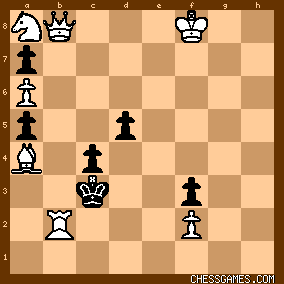| Nov-08-08 | | SufferingBruin: He's only got the one game on CG but, man, what a game. Check it out, people. You won't be disappointed. |
|
| May-08-09 | | vonKrolock: João Caldas Vianna Neto, born in Rio de Janeiro in 1862, son of J. C. Vianna Filho, the Viscount of Pirapetinga - article in Portuguese by M. M. Roland <"As a chess player, he was widely acclamed as the best from South-America"...> <"In 1905, he started a postal game with <Comandante Rudolph Teichman>...> see: Richard Teichmann <After the game, Caldas Vianna showed to Teichman(n) his analysis from openings like the Ruy and the Evans. His variation in the Ruy Lopez was named the 'Rio de Janeiro Variation', merited an article, praised by the great Lasker, and published in "La Stratégie"> Further, his game vs Silvestre anotated in English, and three problems with commented solutions http://www.cxg.org.br/caissana08.htm
More on brazilian chess life in the xixth and early xxth Centuries here Napoleon de Santos discussions and feedback on Caldas Vianna as a composer
http://www.milanvel.net/mp/snapshot... |
|
| May-08-09 | | vonKrolock: That passage, by Geoff Foster, on Caldas Vianna three-mover, is particularly relevant: quote <Bob Meadley has found the original publication of Caldas Vianna`s problem. It was submitted to the first tourney of `The Chess Monthly`, announced in December 1880. The tourney was for a set of four problems - one 2-mover, two three-movers and one 4-mover. First prize was 10 pounds (a lot of money in those days), second prize was 5 pounds and third prize was a chess photo 63cm x 33 cm from a painting by A Rosenbaum. The judges were F C Collins, Frank Healey of Bristol fame and J H Zukertort - a very high calibre trio. Vianna`s set appeared in May 1881 under the motto <`Quo res cumque cadent`>. One of his 3-movers was unsound and so he couldn`t win a prize. The comments to his other 3-mover were as follows: `A very fair composition, although it is not very difficult of solution, and the mates are not so clean as might be expected` (H W Butler). `Very good and rather difficult. The passive knight, the want of variety, and the absence of clean mates are against it` (B G Laws). `Beauty and difficulty combined in a very high degree; in all respects a first-class problem` (W Nash). `A very clever and most ingenious problem` (L Nathan). `Neatness and purity large, originality average, attractiveness large, resultant difficulty average` (`Toz`). The final award appeared in January 1883. H Leprettel of Marseilles won first prize. He died before the final award but did see the preliminary award." ...> |
|
| May-08-09 | | vonKrolock: And Roland, in his own English writing: quote <"The author, Caldas Viana, was a lawyer and journalist born in Rio de Janeiro, 1862. He was also well known as an enthusiast of every facet of chess activities. As a chessplayer, he was by far the best south-american player of his days; so strong he was that he could draw a match with Richard Teichmann in Rio de Janeiro, 1905. As a problemist, I think this composition shows his great talent."> So, it seems that the text in that online article was very carelessly translated by someone... For instance this: <"As a composer, Caldas <sic> Viana was also regarded as <!!??> the best player...> etc |
|
| May-08-09 | | vonKrolock: J. Caldas Vianna
"Chess Monthly, May 1881
Set: 'Quo Res Cumque Cadent'

click for larger view
White to play and mate in three |
|
| Oct-01-10 | | Marcelo Brasileiro: I regret that M. M. Roland has made some translation mistakes from English to Portuguese. |
|
| Oct-02-10 | | vonKrolock: In fact, it seems for me that the imperfect translation referred was not made by Roland ... <in that online article was very carelessly translated by someone> refers to my first post above. Roland's English, on the other hand, seems, en passant, to be excellent... <<"The author, Caldas Viana, was a lawyer and journalist born in Rio de Janeiro, 1862. He was also well known as an enthusiast of every facet of chess activities. As a chessplayer, he was by far the best south-american player of his days; so strong he was that he could draw a match with Richard Teichmann in Rio de Janeiro, 1905. As a problemist, I think this composition shows his great talent.">> |
|
|
|
|






